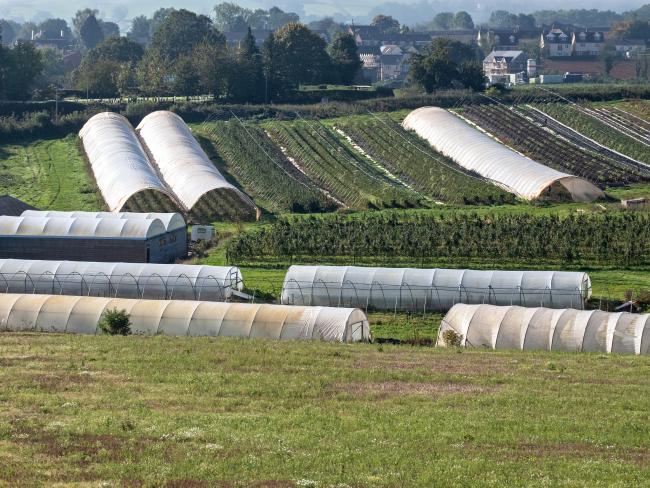27 February 2023

Tomatoes, salads and covered crops can be grown in Britain. Polytunnels used for cultivation on a Devon farm. Photo pjhpix/Shutterstock
Capitalism can’t feed us. Shortages of tomatoes and salad vegetables in British supermarkets have caused supermarkets to ration the number of these items that shoppers are able to buy at a time. But that is symptomatic of wider problems in farming.
The government and the big retailers blame the shortages on anything they can think of: the weather and global warming, labour shortages (in other words, agricultural workers who insist on proper pay and conditions) and, of course, Brexit.
But what lies behind this? Britain has many growers of protected crops (grown under glass or in polytunnels), but the supermarkets would rather go abroad. Although in summer we are more or less self-sufficient, in winter we import around 90 per cent of our consumption of these products.
Reliance
This reliance on imports is exacerbated by huge increases in energy prices, causing growers to switch off lighting and heating. And not only in Britain: in the Netherlands, major suppliers of salad produce, growers did the same, leading to shortages and increased prices.
‘The government met retailers about imported food sources rather than meet British growers about their problems.’
The government response has been to meet retailers to discuss alternative sources of supply, including from Mexico, which produces cucumbers and tomatoes on a massive scale, rather than to meet British growers and address their problems. And the current lack of foods is in part due to transport difficulties from abroad – an inherent risk with imported produce.
Both the prime minster, Rishi Sunak, and would-be prime minster, Keir Starmer, dodged invitations to meet Lea Valley Growers. This area produces around three-quarters of Britain’s cucumbers, sweet peppers and aubergines.
Thérèse Coffey, the Secretary of State for Environment, Food and Rural Affairs is no better. She referred to industrial growers as an “emerging industry, not a long-established one”. Lea Valley Growers has been producing on an industrial scale for 150 years. And they were not alone – for example industrial-scale glasshouses produced tomatoes in Worthing, Sussex until much of the land was sold for housing.
Support
At the National Farmers Union (NFU) conference in Birmingham on 21 and 22 February, the NFU President, Minette Batters, used her speech to call for British farmers to be supported to carry on farming. Other sectors can call on government help with energy costs; even the Royal Botanic Gardens can receive help under the Energy and Trade Intensive Industries scheme. But those growing crops such as tomatoes, cucumbers, aubergines and peppers are ineligible.
Coffey, in a misguided attempt to blame people for their food choices, said that people should cherish roots crops like turnips. Wrong again: turnips are not even in season, as Batters later explained on TV. And she emphasised again that Coffey had shown a disregard for the scale of the challenge for farmers and growers.
Avoidable
The NFU takes a straightforward, well informed, view. NFU vice president David Exwood said Britain needs a plan that involves producing here as well as imports, which cannot be relied on. He pointed to a massive reduction in egg production and continued grubbing up of apple orchards as two examples where food security is avoidably under threat.
Key costs for farmers are spiralling upwards: fertilisers by 169 per cent, energy by 79 per cent (with a further 20 per cent to come in April in spite of falling wholesale prices) and animal feed up 57 per cent. We must prioritise food production to secure our food security, he said.
Petition
The NFU has launched a petition for members of the public to sign, which states “I believe that our shops should never be empty of any ingredients that are produced by farmers and growers in Britain.” It calls on the government to do three things.
- Take stock of British food production every year – to see how well we are doing.
- Hold a national food security summit every year that includes all parts of government.
- At least maintain the levels of food produced in Britain as shown in the 2022 Government Food Strategy
